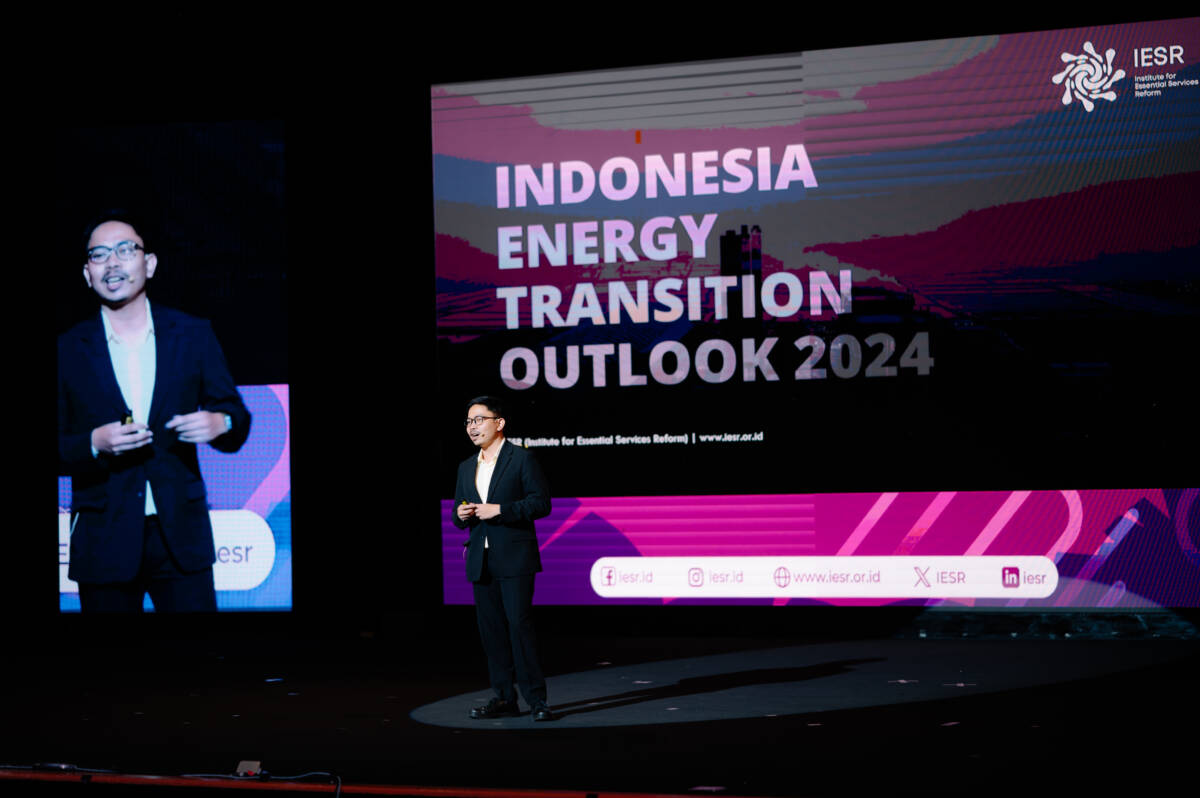Jakarta, 15 December 2023 – In the last three years, there has been a number of advances in the energy transition in Indonesia. Since 2020, the Indonesian government has begun to include the energy transition agenda in the government’s agenda.
At the launch of the annual flagship report Indonesia Energy Transition Outlook 2024, Fabby Tumiwa, Executive Director of the Institute for Essential Services Reform (IESR) emphasized that this progress is important.
“In the last 3 years, Indonesia has attempted to consolidate renewable energy incentive policies. The results are not yet widely visible, but the energy transition issue is increasingly being discussed, has become an important issue, and is on the government agenda. The next stage, with a consolidated policy, Indonesia’s energy transition steps can be faster.”
Fabby added that in compiling the IETO 2024 report, the IESR team used four frameworks to analyze the development of the energy transition in Indonesia including (1) policy and regulatory framework, (2) funding and investment support, (3) implementation of technology, and (4) social impact and public support.
On the same occasion, Dadan Kusdiana, Secretary General of the Ministry of Energy and Mineral Resources (MEMR), stated that the consolidation carried out by the government at this time was not only carried out from a regulatory perspective, but was also carried out from a techno-economic one.
“In our opinion, one of the keys to the success of NZE (net zero emissions) in the power generation sector is the existence of a super grid that connects the islands in Indonesia,” said Dadan.
Indonesia’s decarbonization achievements during 2023 are considered less than encouraging, where in this one year the addition of renewable energy capacity only increased by around 1 GW, far from the 2021-2030 RUPTL target which set 3.4 GW target in the same period.
Alvin Sisdwinugraha, IESR Electricity Sector Analyst, said that Indonesia needs to immediately improve to pursue its decarbonization target, especially in developing renewable energy projects.
“The government can implement a number of strategies including reviewing the project preparation phase, increasing project attractiveness, improving the domestic renewable energy supply chain, and immediately improving electricity network infrastructure,” he said
Alvin also highlighted the biomass development strategy, which is closely related to the availability of land for the feedstock. Considering the limited availability of land, he said. It would be good if the use of biomass is focused on hard-to-abate sectors.
Apart from the electricity sector, other sectors that consume energy are industry and buildings. The industrial sector is the trigger for a significant increase in energy consumption in Indonesia, or around 81%. In 2022, there will be the addition of 5 commercial smelter units, which could have an impact on the potential to double energy consumption by 2023.
Fathin Sabbiha Wismadi, Energy Efficiency Analyst in Buildings, IESR, said that the existence of binding regulations would be an acceleration of energy efficiency.
“We have 6 things that can contribute to reducing energy intensity in Indonesia, first, electrification. Second, energy efficiency, third, regulations regarding energy consumption and energy efficiency, fourth, ecosystem and infrastructure such as charging locations, fifth, incentives and sixth, increase awareness of the Indonesian people,” said Fathin.
From the supply side, at the sub-national level, a number of provinces in Indonesia have completed General Regional Energy Plans (RUED). Anindita Hapsari, Agricultural Analyst, Forestry, Land Use and Climate Change IESR highlights the need for assistance in each region in accelerating the adoption of renewable energy.
“The capabilities of each region are different, requiring assistance in the form of regulations and schemes, both financial and non-financial,” said Anin.
Availability of financing is one of the issues that hinders the acceleration of renewable energy. One reason is that the perception of renewable energy investment is still relatively low. Martha Jessica, IESR Socioeconomic Analyst conveyed that investment in renewable energy generation is still considered a high-risk investment.
“The realization of investment in renewables is also still low. The trend is very far from ideal, in which this year and last year did not reach the target, namely the investment target of USD 1.8 billion in 2023, but last semester only around 30% was achieved,” she said.
The electricity sector is the leading sector in Indonesia’s decarbonization agenda, because it already has a decarbonization roadmap. However, targets in the electricity sector are still not easy to achieve.
His Muhammad Bintang, Energy Storage and Battery Technology Analyst, IESR, said there are at least three things that need to be encouraged to ensure the electricity sector decarbonization target is achieved.
“First, we need to build a clean energy ecosystem, secondly physical and non-physical infrastructure, and prioritize interventions that have been proved,” he said.

